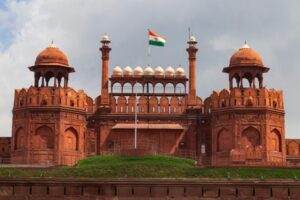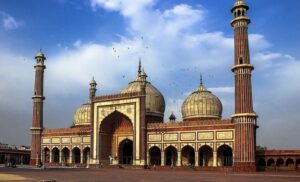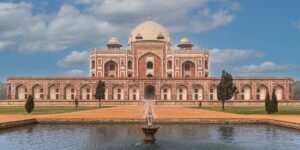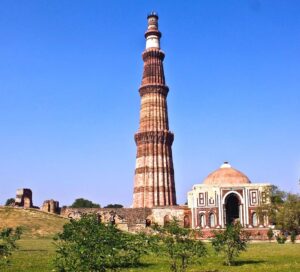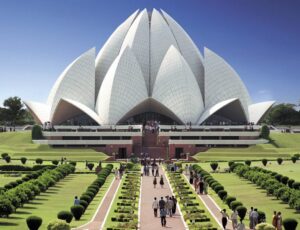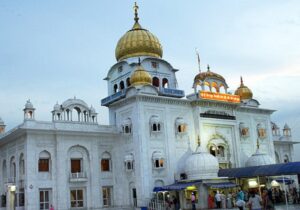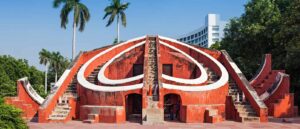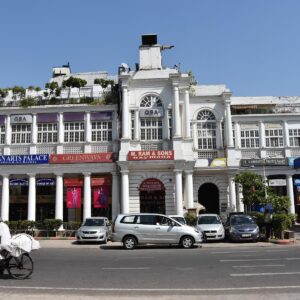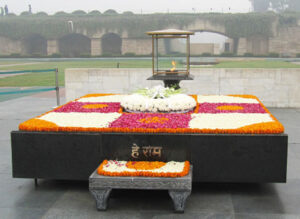10 Best Places to Visit in Delhi:
India’s capital city of Delhi is steeped in history. Enchanting mosques, forts, and monuments from the Mughal emperors who previously ruled the city may be found all over the place. It’s fascinating to spend time exploring both Old Delhi’s meandering streets and New Delhi’s well-planned layouts because of their stark contrasts. Simply go to one of Delhi’s lushly planted gardens if you need some time to unwind. The best sights to see and places to visit in Delhi are listed here.
- Red Fort
- Akshardham Temple
- Jama Masjid
- Humayun’s Tomb
- Qutub Minar
- Lotus Temple
- Gurudwara Bangla Sahib
- Jantar Mantar
- Connaught Place
- Rajghat
-
Red Fort:
The Mughal emperors’ primary residence was the Red Fort, also known as Lal Qila, a historic fort located in Delhi, India’s Old Delhi neighborhood. On May 12, 1639, Emperor Shah Jahan ordered the Red Fort’s construction after deciding to move his capital from Agra to Delhi. Originally designed in red and white, the Taj Mahal was also built by architect Ustad Ahmad Lahori. The fort, which blends Indian customs with Persian palace style, is considered the pinnacle of Mughal construction during the reign of Shah Jahan.
Timings: 7:00 AM to 5:30 PM.
Sundays are closed.
Address: Netaji Subhash Marg, Lal Qila, Chandni Chowk, New Delhi, Delhi, 110006
-
Akshardham Temple:
In Delhi, India, there is a Hindu temple and spiritual-cultural campus called Swaminarayan Akshardham. The temple is situated near Noida’s boundary. The complex, which is also known as Akshardham Temple or Akshardham Delhi, showcases thousands of years of Hindu spirituality, history, and architecture. It was designed by Pramukh Swami Maharaj with inspiration from Yogiji Maharaj and built by BAPS. It is the second-largest BAPS Hindu temple in the world, behind the American temple at Akshardham, New Jersey.
Timings – 9:30 AM to 6:30 PM
Entry Fee:
Adults – 220 INR
Senior citizens -170 INR
Children from 4 to 11 years – 120 INR
Address: Swaminarayan Akshardham, NH 24, Pramukh Swami Maharaj Marg, New Delhi 110092
-
Jama Masjid:
One of the biggest mosques in India is the Masjid-i-Jehan-Numa, also referred to as the Jama Masjid in Delhi.
Between 1644 and 1656, the Mughal monarch Shah Jahan constructed it, and Syed Abdul Ghafoor Shah Bukhari, the first Imam, gave it his blessing. Until the fall of the empire in 1857, it was the imperial mosque of the Mughal emperors, located in the Mughal capital of Shahjahanabad (modern-day Old Delhi). Long after the colonial era, the Jama Masjid was seen as a symbol of Islamic dominance throughout India. Additionally, it played a significant political role during a number of crucial eras of British control. It is still in continuous use and is among Delhi’s most recognisable locations, strongly associated with the spirit of Old Delhi.
Timings:
All days – 7:00 AM to 12:00 PM, 1:30 PM to 6:30 PM
Address: Jama Masjid, Old Delhi, Delhi, 110006
-
Humayun’s Tomb:
The Mughal emperor Mirza Nasir al-Din Muhammad, popularly known as Humayun, is buried in Humayun’s tomb in Delhi, India. In 1993, the tomb was designated as a UNESCO World Heritage Site. Along the walkway leading up to Humayun’s main burial enclosure are a number of lesser monuments.
Timings – 10:00 AM to 6:00 PM
Entry Fee:
Indians – 10 INR
Foreigners (Adults) – 250 INR
Address: Hazrat Nizamuddin Aulia Dargah, Mathura Rd, Nizamuddin, Nizamuddin East, New Delhi, Delhi 110013
-
Qutub Minar:
The earliest walled city in Delhi, Lal Kot, was established by the Tomar Rajputs. The Qutub Minar, also known as the Qutub Minar of Qutub Minar, is a minaret and “victory tower” that is a component of the Qutub complex. Located in South Delhi, India’s Mehrauli neighborhood, it is a UNESCO World Heritage Site. Mostly constructed between 1199 and 1220, it is one of the city’s most popular tourist destinations.
Timings – 10:00 AM to 5:00 PM
Closed on Sundays.
Entry Fee:
Indians – 40 INR
Foreigners – 600 INR
Children below 15 years – Free
Address: Seth Sarai, Mehrauli, New Delhi, Delhi 110030
-
Lotus Temple:
The Lotus Temple is a House of Worship of the Bahá’í Faith, dedicated in December 1986 and situated in New Delhi, India. It has gained popularity as a municipal attraction and is known for its lotus-like design. The Lotus Temple, like all other Bahá’í Houses of Worship, is accessible to everyone, regardless of background or creed. 27 free-standing, marble-clad “petals” grouped in three to form nine sides make up the structure. Nine doorways lead to a central hall that can accommodate 1,300 people and is slightly over 34 meters high.
Timings:
October-March – 9:30 AM to 5:30 PM
April-September – 9:30 AM to 7:00 PM.
Closed on Mondays.
Entry Fee – Free
Address: Lotus Temple Rd Bahapur, Kalkaji, New Delhi, Delhi 110019
-
Gurudwara Bangla Sahib:
The Gurdwara Bangla Sahib, located in Delhi, India, is a well-known Sikh house of worship. It is recognized for its connection to Guru Har Krishan, the eighth Sikh Guru, and for the sacred pond inside its premises, which is referred to as the “Sarovar.” During the time of Mughal Emperor Shah Alam II, Sikh General Sardar Baghel Singh initially constructed it as a tiny shrine in 1783 on the villa granted by King Raja Jai Singh of Amer. Singh oversaw the construction of nine Sikh temples in Delhi that same year.
Situated on Baba Kharak Singh Marg, close to Connaught Place in New Delhi, it is easily identifiable thanks to its imposing flagpole and golden dome.
Timings – Open for 24hrs
Entry Fees – Free
Address: Hanuman Road Area, Connaught Place, New Delhi, Delhi 110001
-
Jantar Mantar:
The contemporary metropolis of New Delhi is home to Jantar Mantar. “Jantar Mantar” translates to “instruments for measuring the harmony of the heavens” . Thirteen architectural astronomy instruments make up this system. This is one of the five locations that Jai Singh II, the Maharaja of Jaipur, constructed starting in 1723 to update the astronomical tables and calendar. Born in 1688 into a Rajput royal family that dominated the surrounding realm, Jai Singh grew up in an educational period where astronomy was still a major subject of study.The observatory’s main goals were to create astronomical tables and forecast the periods and motions of the sun, moon, and planets. These days, astronomy would be used for some of these applications.
Timings : 6.00 am – 6.00 pm
Entry Fee:
For Indians – 15 INR
For Foreign Tourists – 200 INR
Address: Connaught Place, Sansad Marg, New Delhi, Delhi 110001
-
Connaught Place:
One of the primary business, financial, and commercial hubs in New Delhi, Delhi, India is Connaught Place, also referred to as Rajiv Chowk. It is a popular tourist, retail, and nightlife destination in New Delhi, and it is home to the headquarters of some well-known Indian companies. Connaught Place ranked tenth in the world for office site costs as of July 2018.
One of the city’s greatest heritage monuments is the primary commercial district of the newly formed city of New Delhi, which holds great pride in its legacy. Built as the centerpiece of Lutyens’ Delhi, it features a well-known Central Business District (Delhi). Constructed in 1929 and finished in 1933, it bears the name Prince Arthur, 1st Duke of Connaught and Strathearn.
Timings – 11:00 AM to 9:30 PM
-
Rajghat:
Delhi, India is home to the Raj Ghat monument complex. The first memorial honoring Mahatma Gandhi was built with a black marble platform that was elevated to mark the location of his cremation on January 31, 1948, and has an eternal flame at one end. A stone walkway leads to the walled enclosure housing the memorial, which is situated on Delhi’s Ring Road, also known as Mahatma Gandhi Road. Eventually, the memorial complex was extended to house additional monuments honoring notable figures like Atal Bihari Vajpayee, Indira Gandhi, Rajiv Gandhi, Jawaharlal Nehru, Lal Bahadur Shastri, Charan Singh, and Rajiv Gandhi.
Timings – 6:30 AM to 6:00 PM
Entry Fee – Free
Addrees: Behind Red Fort, Delhi, 110006

